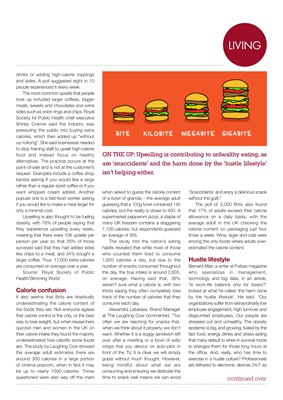
KITLIVING
drinks or adding high-calorie toppings
and sides. A poll suggested eight in 10
people experienced it every week.
The most common upsells that people
took up included larger coffees, bigger
meals, sweets and chocolates and extra
sides such as onion rings and chips. Royal
Society for Public Health chief executive
Shirley Cramer said the industry was
pressuring the public into buying extra
calories, which then added up "without
us noticing". She said businesses needed
to stop training staff to upsell high-calorie
food and instead focus on healthy
alternatives. The practice occurs at the
point-of-sale and is not at the customer's
request. Examples include a coffee shop
barista asking if you would like a large
rather than a regular-sized coffee or if you
want whipped cream added. Another
popular one is a fast-food worker asking
if you would like to make a meal larger for
only a minimal cost.
Upselling is also thought to be fueling
obesity, with 78% of people saying that
they experience upselling every week,
meaning that there were 106 upsells per
person per year so that 35% of those
surveyed said that they had added sides
like chips to a meal, and 34% bought a
larger coffee. Thus 17,000 extra calories
are consumed on average over a year.
Source: Royal Society of Public
Health/Slimming World
Calorie confusion
It also seems that Brits are drastically
underestimating the calorie content of
the foods they eat. Not everyone agrees
that calorie control is the only, or the best
way to lose weight, but when researchers
quizzed men and women in the UK on
their calorie intake they found the majority
underestimated how calorific some foods
are. The study by Laughing Cow showed
the average adult estimates there are
around 300 calories in a large portion
of cinema popcorn, when in fact it may
be up to nearly 1000 calories. Those
questioned were also way off the mark
when asked to guess the calorie content
of a bowl of granola - the average adult
guessing that a 100g bowl contained 145
calories, but the reality is closer to 450. A
supermarket pepperoni pizza, a staple of
many UK freezers contains a staggering
1,100 calories, but respondents guessed
an average of 355.
The study into the nation's eating
habits revealed that while most of those
who counted them tried to consume
1,920 calories a day, but due to the
number of snacks consumed throughout
the day, the true intake is around 2,635,
on average. Having said that, 36%
weren't sure what a calorie is, with two
thirds saying they often completely lose
track of the number of calories that they
consume each day.
Alexandra Labaisse, Brand Manager
at The Laughing Cow commented, "Too
often we are reaching for snacks that,
when we think about it properly, we don't
want. Whether it is a soggy sandwich left
over after a meeting or a bowl of salty
crisps that you devour on auto-pilot in
front of the TV, it is clear we will simply
graze without much thought. However,
being mindful about what we are
consuming and ensuring we dedicate the
time to snack well means we can avoid
'Snaccidents' and enjoy a delicious snack
without the guilt."
The poll of 2,000 Brits also found
that 17% of adults exceed their calorie
allowance on a daily basis, with the
average adult in the UK checking the
calorie content on packaging just four
times a week. Wine, lager and cola were
among the only foods where adults overestimated the calorie content.
Hustle lifestyle
Bernard Marr, a writer at Forbes magazine
who specializes in management,
technology and big data, in an article,
'Is work-life balance only for losers?'
looked at what he called 'the harm done
by the hustle lifestyle'. He said, "Our
organizations suffer from extraordinarily low
employee engagement, high turnover and
disgruntled employees. Our people are
stressed out and unhealthy. The obesity
epidemic is big, and growing, fueled by the
fast food, energy drinks and stress eating
that many default to when in survival mode
to energize them for those long hours at
the office. And, really, who has time to
exercise in a hustle culture? Professionals
are tethered to electronic devices 24/7 so
ON THE UP: Upselling is contributing to unhealthy eating, as
are 'snaccidents' and the harm done by the 'hustle lifestyle'
isn't helping either.
continued over